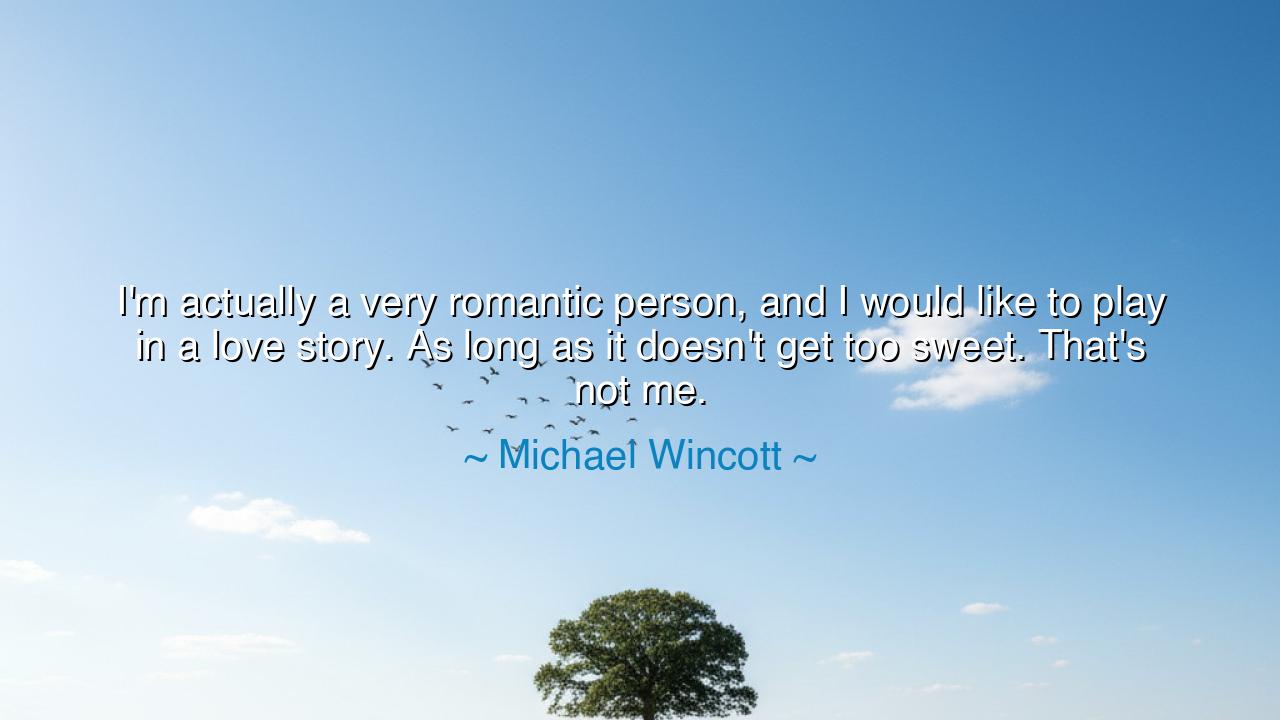
I'm actually a very romantic person, and I would like to play in
I'm actually a very romantic person, and I would like to play in a love story. As long as it doesn't get too sweet. That's not me.






"I'm actually a very romantic person, and I would like to play in a love story. As long as it doesn't get too sweet. That's not me." These words spoken by Michael Wincott reveal a deep and honest insight into the complex nature of romance. Wincott acknowledges that while he embraces the romantic within himself, he does not desire the overly idealized or saccharine portrayal of love. Instead, he yearns for something that captures the truth of love—its depth, its complexity, and its imperfections. This reflection speaks to the timeless human struggle to reconcile the ideal with the real, the romantic with the practical, the light with the dark. True love, as Wincott suggests, cannot simply be defined by sweetness or superficial charm, but by the truth of the emotions it stirs, the sacrifices it demands, and the profound connection it fosters between individuals.
In the ancient world, love was often depicted not as a simple or sweet emotion, but as a force that could be dangerous, transformative, and sometimes destructive. The great Greek myths often tell of love’s ability to elevate and destroy. Take, for instance, the love story of Pygmalion and his statue, Galatea. Pygmalion, a sculptor, falls in love with a statue he has created, so much so that the goddess Aphrodite grants his wish to bring her to life. While the story is romantic, it is not without its darker undercurrents. The intensity of Pygmalion's obsession, the idealization of Galatea, is at once beautiful and unnerving. The ancient Greeks understood that love is not always about perfection or sweetness, but often about the depth of one’s longing and the struggles that accompany it.
Similarly, the love between Romeo and Juliet—though celebrated in the annals of romantic literature—is far from sweet. It is tragic and full of tension, driven by passion but undermined by fate and family conflict. Their love, though pure, is fraught with obstacles, misunderstandings, and a sense of urgency that ultimately leads to their untimely deaths. This story is not the hallmark of saccharine love, but one that captures the true nature of romance in its rawest form. In this, we see that romantic love is not simply about sweetness, but about a deeper emotional connection that binds two souls together, often in the face of great adversity.
In modern times, we often find ourselves faced with a similar conflict—how to reconcile the idealized vision of love with the realities of life. As Wincott suggests, true romance cannot be reduced to a formulaic sweetness, but must encompass the full spectrum of human emotion. Love, when it is real, is imperfect, full of misunderstandings, sacrifices, and moments of profound connection, as well as moments of pain. It is through these imperfections that we truly understand what love is. The longing, the struggle, and the vulnerability that come with real love are what make it worth experiencing. To present love as something always perfect and easy would be to diminish its power and its ability to transform us.
Consider the legendary story of Antony and Cleopatra, whose love was filled with grandeur but also fraught with political intrigue, betrayal, and ultimately, tragedy. Their romance was not about sweetness but about political power, passion, and the intense forces that shaped their world. Yet, despite the challenges, their love story has endured as one of the most famous in history, not because it was sweet, but because it was real, and it carried the weight of history with it. The realness of their connection, tempered by both their love and their struggle, is what makes their story so poignant and lasting.
So, the lesson to take from Wincott’s words is this: true romantic love cannot be boiled down to a sweet and perfect ideal, but must embrace the full range of human experience—the highs and the lows, the joy and the sorrow, the passion and the sacrifice. We must not seek the idealized, sugar-coated version of love that many portray, but instead, we must embrace its depth, its complexity, and its power to transform. Love, in its truest form, is not about perfection, but about connection. It is about growing together, facing challenges, and understanding that love, when real, will be messy, imperfect, and yet profoundly beautiful in its rawness.
To future generations, I say this: do not be afraid of the imperfect aspects of love. Embrace the complexity, the struggles, and the sacrifices that come with real romantic connections. Love is not a story without flaws, but a journey that tests us, changes us, and ultimately makes us whole. Let your romantic love be deep, genuine, and true, recognizing that it is not the sweetness alone that defines it, but the ability to navigate the realness of each other’s hearts. In this, you will find the greatest form of romance, one that transcends the superficial and touches the very core of what it means to be human.






AAdministratorAdministrator
Welcome, honored guests. Please leave a comment, we will respond soon